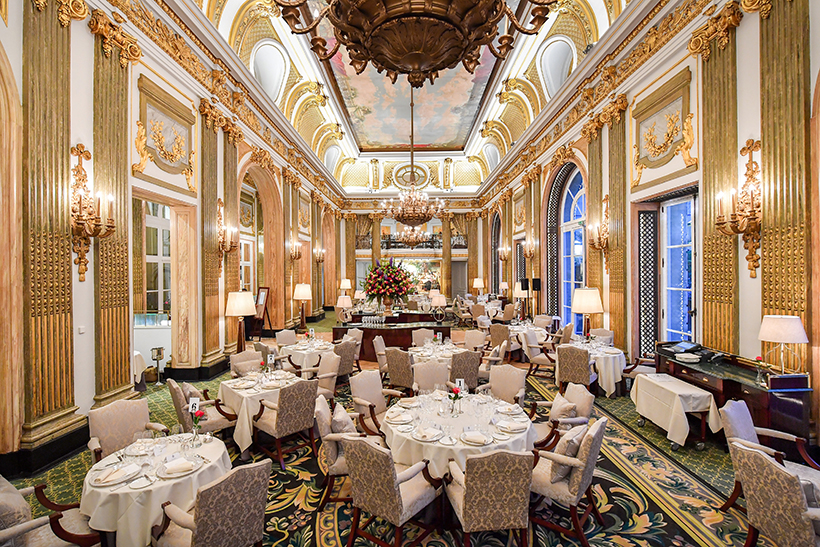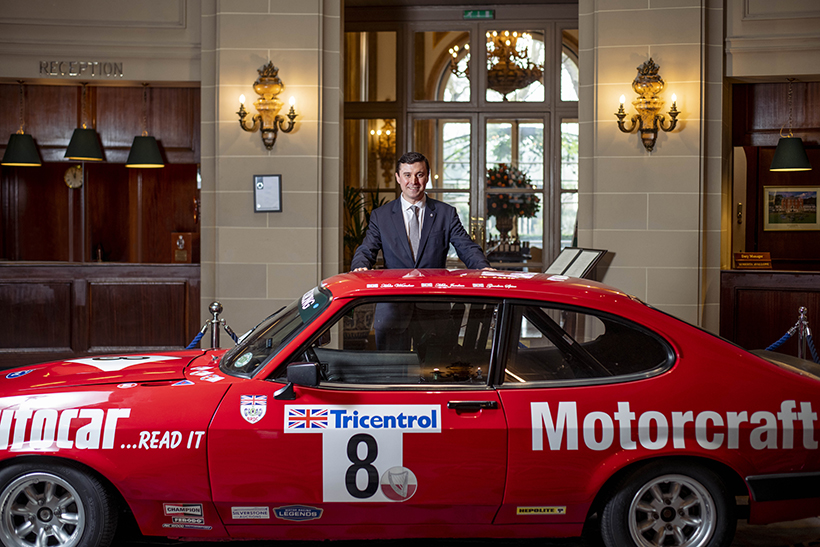The chief executive of the Royal Automobile Club has to balance the private members' club's heritage with developing for the future
The Royal Automobile Club was founded in 1897 – give me an overview of the business and how it has changed since then.
We are a private members' club. The heart of the club is motoring, and it was started by pioneers of their time who loved the automobile and set out to prove that it was a valid method of transport. It was never purely a motoring club. At the heart of it was a social element, which is still alive today. These days people love the sports facilities and food and beverage facilities, as well as the busy events schedule that we have. We started as a male-only club and in 1999 the club accepted women. These days we are a very diverse club with 17,000 members.
You were promoted from chief operating officer to chief executive in May. How has your role changed?
I'm now responsible for setting the strategic direction of the club, where previously I was delivering the strategy. In practical terms there's engagement with key stakeholders and partners, including the London club scene.
I meet my counterparts, as people would in the hotel industry, which is helpful in terms of getting a broad picture of what's happening in this sector of hospitality.
What are the main topics of conversation – is it all about recruitment?
That is the first issue that comes up, but the economic risks are at the forefront of everyone's minds, too. Energy costs are a big risk right now, while there is inflation in wages and goods, and disruption in the supply chain to consider. The lead time for goods is particularly long. For example, greenkeeping equipment used to be a four-to-six-week lead time, now it's a year.
What development plans do you have for the business?
Being an organisation with over a century of heritage revolution is not a good thing. We have to evolve and continue to be relevant to the changing needs of our members. At this stage I'm in the process of learning about the role. What I can say is that the needs of our members will be the guiding principles of our decision-making process, including value for money and excellent service.
Our team is what makes the club. We have wonderful assets, beautiful buildings and a fantastic estate in Epsom, but it is the people that convey the membership experience. We have close to 20 employees with more than 25 years' of service, and over 130 staff with more than two years' of service. This is from a team of 585, so I would say that's exceptional.
Where do you benchmark yourself? Is it in clubland or as a hotel operator?
I'd say in clubland. We have two clubhouses: Pall Mall in London and Woodcote Park in Surrey. Few clubs have multiple sites, except the more hybrid clubs, like the Soho House group. Culturally, we are a private members' club, and there is a distinct difference between a members' club and a commercial hospitality environment.
Your members are your owners and there isn't quite the same level of focus on delivering a profit at the end of the year. We have to run the business professionally as it has to be successful. Commercially we are not for profit, so everything we make we invest back into the business, whether that's in development of our product or our people.
On the service side we look at some of the leading hospitality organisations and hotels around us, including the Sofitel London St James Hotel, the Ritz London and Brown's. These wonderful hotels are very different in a way, but the level of experience is comparable.
Do you focus on revenue management or are room nights in your 130 bedrooms across both clubhouses a fixed price for members?
It was a published rate when I joined, which I hadn't been used to since the early 2000s, but we have implemented a degree of flexibility. We tend to do it through various promotions, both seasonal and tactical, and are moving towards a more flexible rate structure. It does take some time in a private members' club environment to make such a significant change.
In terms of facilities we are comparable to a large five-star property but we are incredible value for money. In comparison to the local four-star market our rates are about 50% of what they would charge. So the concept in club-land is that you get a nasty bill once every year, but then every time you come back to the club it's a nice surprise when you come to pay.
So costs within the club are subsidised?
The business concept is that we take the annual subscriptions and subsidise services. In our restaurants we look to discount by 20% compared to the competitor set in the market, so every time someone eats at one of our restaurants we subsidise their meal. But that's a strategic decision. It's challenging with food prices rising, but it's important that we keep it at the heart of our offering.
How has a background in hotels prepared you for work in clubs?
Certainly, the last few roles I had led me into it. At the Old Course at St Andrews we had a membership within the golf course and spa, so I got that feel for a members' environment. When I was at the Scotsman hotel in Edinburgh we had an element of private membership in the spa. That gave me a bit of an insight.
The culture of those organisations was very inclusive too, as it is here. You have so many different stakeholders and you have to keep people engaged if you want to maintain that trust within the membership. So if we are refurbishing an element of the club we create a working party of members or super-users of that area, staff and management and professional services. Inevitably you will never please everyone, but we're as inclusive and transparent as we can be.
Recruitment is obviously a huge issue for all operators right now. How are you finding the market?
It is very challenging. I recall when I got the job here I spoke to a number of people in my network who asked me why I was looking to retire at my age. I queried it and they said: "Well, you go to clubland to retire". And clubland does have an image within commercial hospitality of a sleepy hollow where nothing really happens. Having worked in the sector for nine years, I can say there are some organisations at a slower pace, but our club and many others are far from that perception. They are innovative, creative and incredibly busy. From an engagement and communications point of view, I'm the busiest I've ever been as I have so many stakeholders to work with.
This perception can have a negative impact on people joining the industry, but we must continue to work to break down those barriers.
Have you had to work on the flexibility of job roles?
I think throughout hospitality we have historically had a rigid structure and there are some benefits to that. But what we've had to learn rapidly is that flexibility is important. The pandemic has allowed people to re-evaluate their priorities and they don't necessarily want to work a 40-50 hour week. We need to adapt to job sharing and, where possible, working from home. So if we can offer someone something that better engages them, provided productivity is not suffering, why shouldn't we consider it?
For us reward and recognition is so important; feeling valued is key. So often in hospitality we rely on goodwill and looking some-one in the eye and shaking their hand is a very powerful thing.
Matthew Marshall took over as executive chef from Philip Corrick in 2019, who had led the brigade for 29 years. What changes has he introduced?
Matthew Marshall is a great example of someone who worked in clubland and went off to gain experience elsewhere before returning. Philip was incredible – an institution – and Matthew worked for him around a decade ago before coming back to succeed him. It's a great example of people wanting to return as they genuinely loved the experience here.
Matthew truly believes in seasonality and in keeping it simple. It's about the quality of the ingredient. He produces some superb food and he loves to empower his team. We believe in developing our people so where we can, we send them out to other organisations to develop their skills. It's important to know what's going on elsewhere.
Daniel Pereira on service
"I genuinely believe we work in this industry to make people happy. We provide them with service and, if we do it well, you can't put a price on it.
"I always say to my team not to underestimate the importance an individual puts on a visit to our restaurant. I look forward to comments like, ‘this is the first time away from our children for a year'. People can look forward to this day for months. For our team on the floor, what they are providing is a meal, but you have to look beyond that – for some it means so much more.
"It is a pampering moment, so providing them with exceptional service, being attentive listeners and applying that engagement to make people feel delighted and that they are appreciated is a wonderful thing to do. How you make people feel is what matters."
The Royal Automobile Club
Pall Mall
Bedrooms 108
Restaurants The Great Gallery, the Brooklands Room, the Long Bar, the Cocktail Bar and the Drawing Room
Bars The Cocktail Bar, the Long Bar, the Drawing Room
Sports facilities Four squash courts, including a doubles court, swimming pool, gym, Turkish baths and treatment rooms
Woodcote Park
Bedrooms 22
Restaurants Stirling's, the Fountain Brasserie, the 19th Hole and the Garden Café
Bars Spike Bar, Hurricane Bar
Sports facilities Squash courts, tennis courts, swimming pool, gym, treatment rooms and dedicated children's sports facilities
Continue reading
You need to be a premium member to view this. Subscribe from just 99p per week.
Already subscribed? Log In







